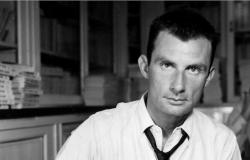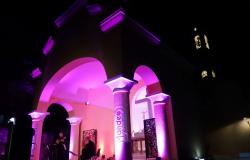
By
Léa Pippinato
Published on
June 13, 2024 at 4:34 p.m.
See my news
Follow Metropolitan
This Saturday June 15, Montpellier is preparing to celebrate a significant milestone: the 30th anniversary of its Pride. Since its humble beginnings in 1994, this event has become a major symbol of the fight for LGBTQIA+ rights in France. Every year, thousands of people gather to march, celebrate, and above all demand a more just and inclusive society. Over the decades, Montpellier Pride has evolved, adapting to the challenges of each era while remaining faithful to its militant and festive spirit. Through this retrospective, we return, with Olivier Vaillépresident of the organizing association Fierté Montpellier Pride, on the significant moments, the victories and the fights which shaped this unmissable event.
In what historical context was the first Montpellier Pride March?
Following the first marches created in the United States after the Stonewall riots on the night of June 28, 1969 in New York City, Gay Pride, as well as Lesbian & Gay Pride, arrived in Paris and were part of the movement of sexual liberation. At first, these were only informal events, then, with the election of François Mitterrand, and more broadly the decriminalization of homosexuality, things began to change. Several organizations and associations came together to create the first marches. Initially, everything was centered on Paris, and without an official march in the provincial space, it felt isolated from this phenomenon of freedom. About ten years later, Pride was born in Lyon, Marseille, and even Angers, reaching Montpellier in 1995. The LGBTQIA+ community was already quite large at the time in this young and student city. There was also a substantial associative fabric, with a CGL (gay and lesbian center), allowing the movement to establish itself there.
Was the first Montpellier Pride a complex process to put together?
Our association has always been responsible for organizing Pride. At the time, it was not called Fierté Montpellier Pride, but LGP (Lesbian & Gay Pride) Montpellier Languedoc-Roussillon, itself bringing together five associations and 14 establishments. His activity was mainly limited to organizing the march. The slogan of this first demonstration was “Let’s come out of our closets”, because even if the LGBTQIA+ community was very present in Montpellier, many did not dare to appear in public, especially in the middle of the night. Moreover, among the gay-friendly bars, there was the Café de la Mer. Faced with this lack of visibility to fill, the first Pride was created somewhat urgently since it was concomitant with the foundation of the organizing association. As for the event itself, it was special, a novelty in its own right. There were only two tanks and 1,000 people present.
Has intersectionality always been relevant?
What is intersectionality?
Intersectionality is a sociological notion that designates the way in which different forms of oppression such as racism, sexism, fatphobia, handicapphobia, homophobia, transphobia, and others, are articulated. and reinforce each other.
It was introduced by Afrofeminist scholar Kimberlé William Crenshaw in 1989 to speak specifically to the intersection between sexism and racism experienced by African American women. She observed at the time that African-American women experienced discrimination different from that experienced by white women or black men in the United States. They have more difficulty finding work both because they are women and because they are black. They therefore live their own experience which is the result of the articulation of racism and sexism.
The people behind the Stonewall riots were transgender, black, sex worker women. At the time of the creation of Pride, there was a movement to recover the gay community, and others in parallel who demanded to be more represented. When there was still the term “Gay Pride” or “Lesbian and Gay Pride”, it was not really inclusive. At the end of the years, we tried to restore all of the diversity. When Vincent Autain (France’s first gay groom) was president of the association, one of the Pride slogans was “Let’s march for those who cannot”. It was a way of referring to people who cannot participate in the march, but also to those who suffer other discrimination, particularly linked to their disability. The role of Fierté Montpellier Pride is to include as many people as possible. For example, we also have nothing to say to polyamorous participants who come as a couple of three or more to the Pride March. It is not our role to judge.
In 2008, 8,000 people participated in Montpellier Pride, compared to around 16,000 last year. How do you explain the increase in the number of participants over the years?
Pride truly represents militant moments and we try to impose this commitment on the basis of extremely strong speeches. The day before the event, we meet to take stock of the different speeches. The role of the association, and more broadly of the event, is to highlight all the organizations working for LGBTQIA+ rights. For example, if people come for questions about PMA and GPA, the first thing to do is to send them to SPOT, the 100% free sexual health center of the AIDES association, acting itself to prevent and treat sexually transmitted infections. This versatility of the associative Village present every year helps a lot to reach a wide audience.
This year, the slogan of the Pride March is “Revolté.es”. Is it important that the event reinforces its activist aspect?
Beyond Pride, we do not live in a bubble, we live in a society whose evolution we cannot ignore. Depending on the situation, we will try to highlight families, GPA or other current issues. I think about slogans based on current events. In 2021, the slogan “Our pride is without borders” was linked to the situation of asylum seekers. Moreover, when I joined the association in 2017, I started as a simple volunteer, then after a year, I formalized a center dedicated to these questions with legal monitoring on rights LGBTQIA+ in the countries concerned and the implementation of detailed certificates.
In 2018, the slogan “Are our rights on the march?” » referred to the election of Emmanuel Macron the previous year, but above all to a global lack of will to fight against discrimination. When François Hollande introduced marriage for all, it was undeniably a big step forward. Beyond this societal reform which now protected all couples, basically, it generated media hatred, fueling the comments that we know today. To be clear, an openly assumed LGBTQIAphobic speech has emerged. In this context which is not improving, it is impossible to put aside activism.
How will the event evolve in the years to come?
We try to improve things for future editions while keeping, in our opinion, strict elements representing our main value: diversity. To cite a case that occurs regularly, several people are looking for selected single-sex areas. They can definitely get together if they wish, but we are not going to create dedicated spaces during the event.
The only time we allow it is for participants who have difficulty following the walk due to their disability. Last year, a small train rolled behind the Region’s float, without music, for those who have trouble with auditory stimulation. For this 2024 edition, we are planning two, one at the start and one at the end of the procession. Each vehicle is equipped with a specially equipped PMR (people with reduced mobility) wagon. Each time, we proceed the same way: we examine the past edition and we try to see what can be improved. Potential changes are made based on current events and what the LGBTQIA+ community may be feeling.
Follow all the news from your favorite cities and media by subscribing to Mon Actu.





